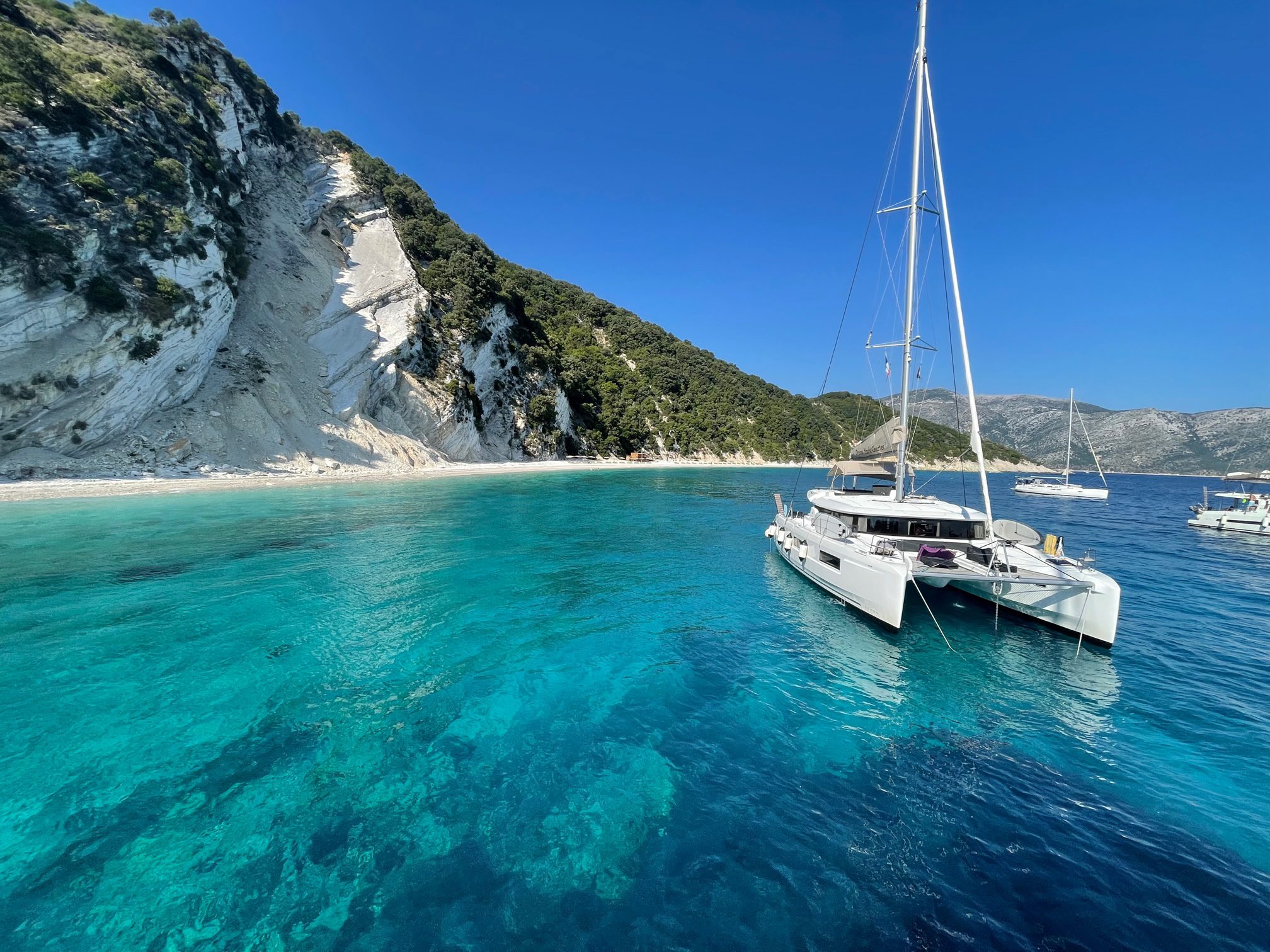Imagine relaxing on a luxury sailboat while a professional captain guides you from Greek island to Greek island through the clearest blue waters you have ever seen. Life can’t get any better than that! The first time I sailed Greece, I scoured the internet for what to expect and how to plan, and I found very little information. So here I am letting you know all the things I learned about sailing the Greek Islands.
First Things First…
The first thing you need to do is get your group together. Boats vary in size and capacity, so how many people commit to going is vital. It is also important that all people in your group are on the same page for the budget. Boats can also vary differently in pricing based on their size and amenities offered. If you cannot gather enough people to occupy a private boat, some companies offer options where you can book with other vacation-goers. Think of it like a hostile on water.
Alternatively, if you have more people committed than the capacity allows on a boat, you can consider a flotilla. This is where multiple boats travel together. When you stop, you can tie the boats together so the passengers can pass between the boats and everyone can vacation together.
What Type of Boat to Choose

Your next major decision is what type of boat to choose when sailing the Greek islands: single hull sailboat or catamaran. The single hull boat is the typical sailboat you think of when sailing. However, my choice of boat is the catamaran. Since the catamaran has double hulls, there is typically more room to walk around and lay out. On a windy day, the single hulls will move a lot more than catamarans making them a little more dangerous when topside. Also, if you suffer from sea sickness, this could be a big problem on the single hull.
If your intent of sailing the Greek islands is to actually sail, then the single hulls are what you want to book. Captains of the catamarans will use the motor more than the sails. If you are excited by the idea of sailing, then you may be turned off by the catamaran. But I am here to tell you that “sailing” is overrated and the catamaran is the way to go.
Sailing the Greek Islands – When to Sail?
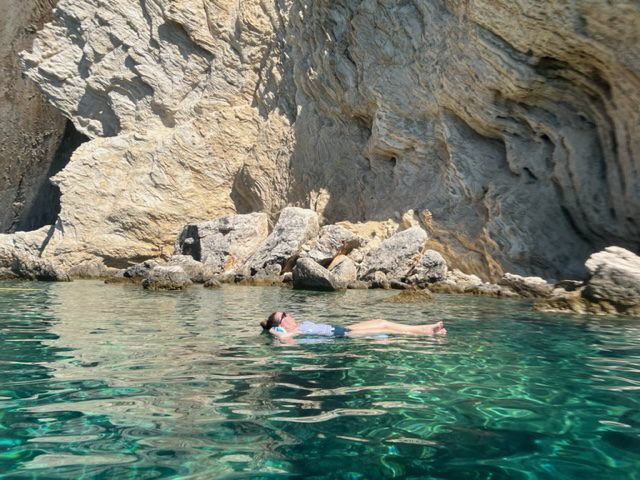
The Greek islands sailing season is May to October when the weather is warm. One common misconception about Greece is that it is warm year round. But this is not the case at all, and some parts of the mainland gets quite a bit of snow in the winter. The most popular months for sailing the Greek islands is July and August which also make it the most expensive months. If you are looking for discounts on boat costs and the best weather, consider traveling late May, June, September, and early October.
Most sailings are booked for one week, and those are all booked from a Saturday to a Saturday. Of course, if you are looking to sail longer than a week then you can book as such. Some of the island groups are too big to see them all in just one week, so multiple sailing weeks may be what you are looking for if it is in your budget.
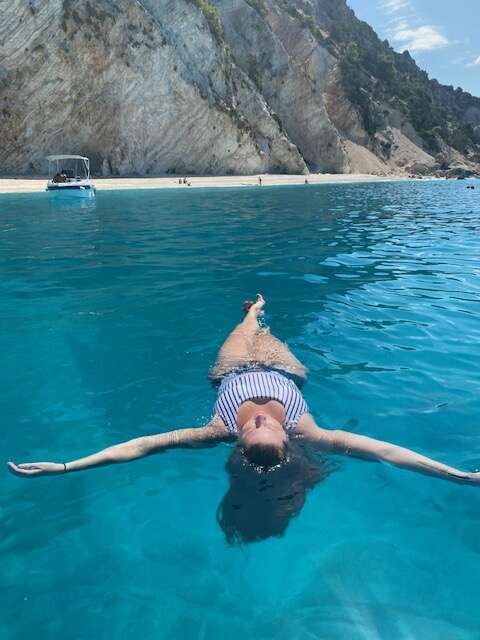
The other thing to consider when deciding when to book is Yacht Week. Yacht Week is a set time each year where people charter boats and follow the same itinerary. Each night the port on the itinerary hosts giant parties for the yacht-goers. Depending on if you want to party with these people or not, you will need to plan for it or plan to avoid it.
Sailing the Greek Islands – Which Islands to Choose?
With over 6,000 islands across the Greek seas, your Greek island destination possibilities are endless. However, there are 4 groups of islands that are most popular for sailing: Cyclades, Saronic, Ionian, and Sporades.
Cyclades Islands

The Cyclades Islands, located in the Aegian Sea, are the most well known islands in Greece with popular islands like Mykonos and Santorini. You can choose to start sailing from Athens or from a port among the islands such as Mykonos, Paros, or Naxos. A direct flight to Athens will be cheaper than a flight to one of the islands. However, you will spend a lot of time on the water traveling from Athens to the islands, so you must weigh what is most important to you.
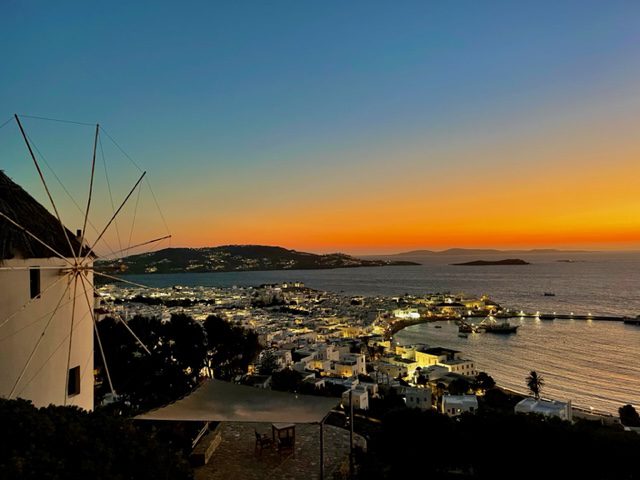
Why to NOT Choose the Cyclades Islands
When choosing islands groups to sail, it may seem obvious to choose the Cyclades because of the islands’ popularity. But there are some reasons why you may want to consider other island groups. Santorini, one of the islands you will likely want to sail to, is too far from Athens, and you would not be able to make it there if you are only sailing for a week. Also, the Meltemi winds are seasonal winds that can make sailing unbearable or even impossible. These winds are the strongest in the Aegian Sea, which means the Cyclades islands are the most affected. The Meltemi winds are the strongest in July and August but can also affect the weather in June and September.
Saronic Islands

The first time I sailed I had planned on sailing the Cyclades. Upon arrival, the boat owner and captain informed us that due to the strong Meltemi winds, we would not be able to sail to the Cyclades as planned. Instead, we sailed to the Saronic islands which are much closer in distance to Athens. Even though these islands are not as popular, we still had an amazing time sailing the Greek islands. We spent several days around the island of Poros which offered protection from the high waves caused by the Meltemi winds.
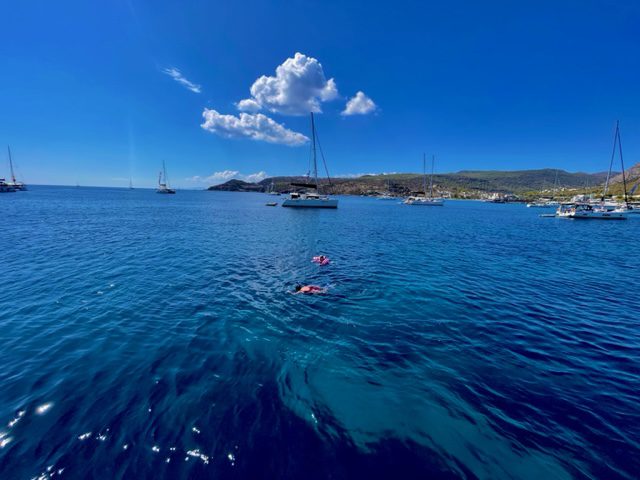
If you plan on sailing the Cyclades but the weather prohibits you from that, the Saronic islands are a wonderful Plan B option if you are sailing out of Athens.
Ionian Islands

When I first researched islands to sail, the Ionian islands looked the most beautiful and were the islands I wanted to sail. However, the rest of the group out-voted me and chose the Cyclades. I was vindicated when our captain agreed that the Ionian islands are his favorite because of their beauty. For our second trip sailing the Greek islands, we chose the Ionian, and they did not disappoint! I have visited islands in 3 of the 4 island groups, and I can confidently say that the Ionian islands are the ones you should choose! As a side note, the Ionian islands are not affected by the Meltemi winds because they are located on the west side of the mainland.
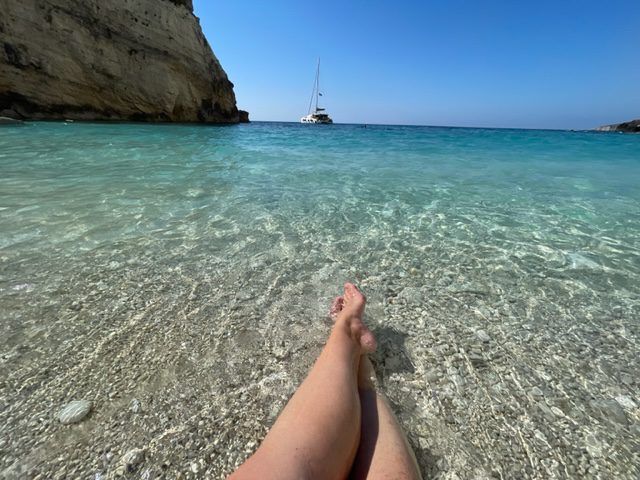
The Ionian and Sporades islands will be a little more difficult getting to than the Cyclades and Saronic because you will have to start from a different marina than one located in Athens. The major Ionian islands include Lefkada, Ithaca, Kefalonia, Corfu, and Zakinthos. If you are only planning to sail for a week, you will not have time to include Corfu or Zakinthos. You will most likely sail out of Lefkada. There is an airport you can fly to in the nearby town of Preveza, but flights here are significantly more expensive than flying into Athens (at least from the United States). To save costs, we opted to fly into Athens and book a roundtrip transfer shuttle to transport us back and forth through mytransfer.com. While this drive is 4 hours each way, it was a gorgeous drive through the Greece countryside. It also offered time for a nap after our long overnight flight.
Sporades

The Sporades islands are the only group of the four that I have not yet visited but is next on my sailing the Greek islands bucket list. Major islands here include Skiathos, Skopelos, Alonissos, and Skyros. These lesser known islands were some of the filming locations of Mamma Mia including the church at the end of the movie on the island of Skopelos. The most likely marina to start sailing from is Skiathos. You can catch a ferry to Skaithos from 4 mainland ports: Volos, Mantoudi, Agios Konstantinos, and Thessaloniki. The Sporades islands can also be affected by severe Meltemi winds.
What Crew Will You Need?
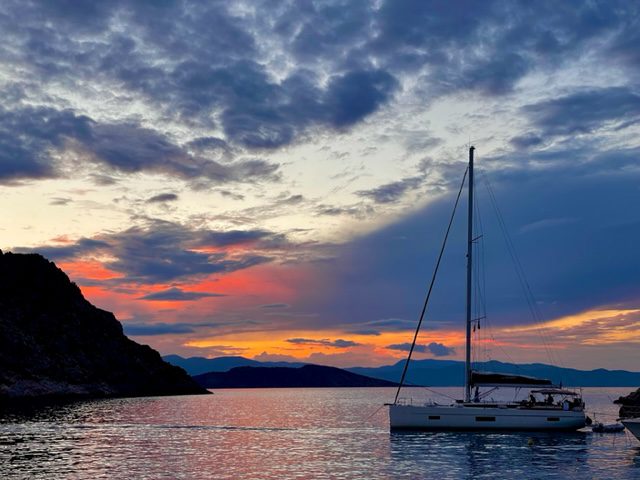
The last major decision to make before booking your boat is to decide what crew to hire, if any. Unless you are an expert at sailing, you will need to hire a captain as a minimum. You will also need to decide if you want to hire a cook for your trip. The cook will prepare all your meals on board and may even grocery shop for you. The fee for a captain or cook is around 1,000-1,500 EUR per week per worker and is in addition to the cost of the boat rental. This fee does not include the costs of food for you or the crew. If you cook on the boat, make sure to buy enough food to also include the crew’s meals. If you eat at a restaurant, you can either invite your crew along (and pay for their meal) or you can give them cash to eat on their own. You are responsible for feeding the crew. We ultimately decided that the cost of a cook wasn’t justifiable. We generally ate a light breakfast and lunch on the boat with minimal cooking. And we ate dinner every night at a restaurant in the port where we were staying.
Chartering a Boat on Your Own
To charter a boat on your own, you must have a certified skipper and an experienced crew member on board (both over the age of 18.) Generally, certifications for skippers in Greece must be one of the following, but verify with your boat charterer for specific requirements for the skipper and first mate on board:
![]() ICC (International Certificate of Competence) or complete the ICC Assessment form to prove competence from previous experience.
ICC (International Certificate of Competence) or complete the ICC Assessment form to prove competence from previous experience.
![]() IPC (International Proficiency Certificate), America Prerequisites: ASA 104 or US Sailing “Bareboat Cruising Course”
IPC (International Proficiency Certificate), America Prerequisites: ASA 104 or US Sailing “Bareboat Cruising Course”
![]() USA – US Sailing “Bareboat Cruising Course”, ASA “104 Bareboat Cruising Course” or above.
USA – US Sailing “Bareboat Cruising Course”, ASA “104 Bareboat Cruising Course” or above.
![]() CANADA – CYA “Intermediate Cruising Standard” or higher or “Canadian Pleasure Craft Operator Card”.
CANADA – CYA “Intermediate Cruising Standard” or higher or “Canadian Pleasure Craft Operator Card”.
While most boats have crew quarters where the captain and cook can sleep, most do not have separate bathroom facilities for the crew (at least not for the price I was willing to pay.) This means the crew will have to use one of your bathrooms. This is something to think about when deciding room assignments.
Sailing the Greek Islands – How to Book?
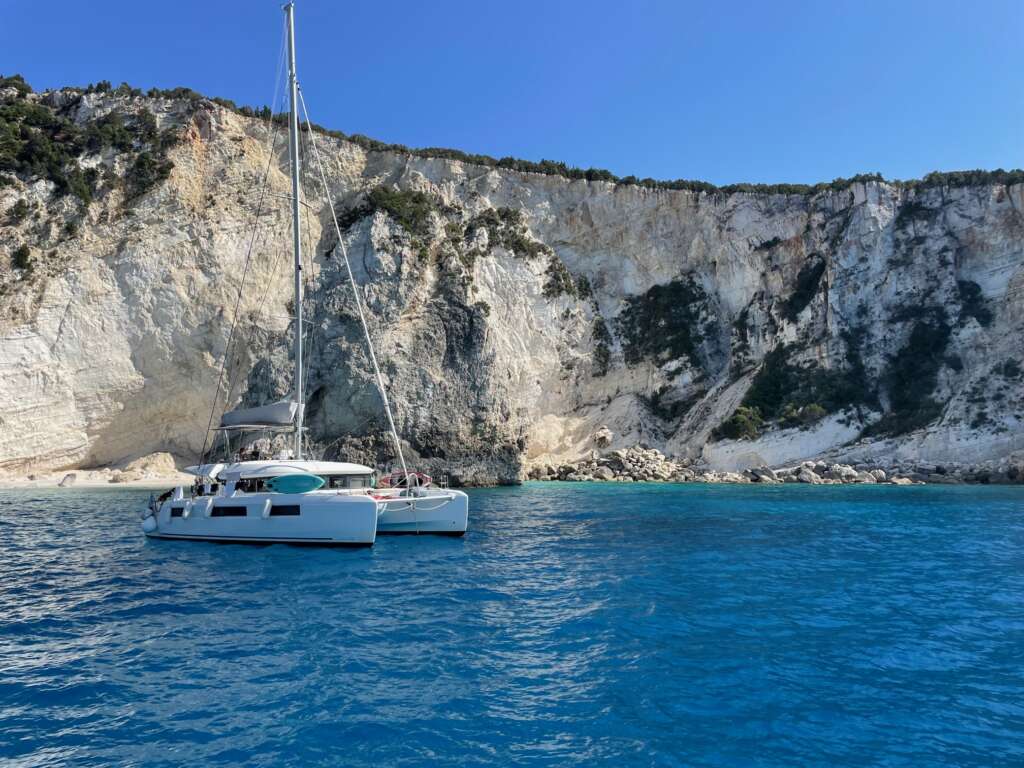
Now that you have your major decisions decided, it is time to book your boat. If you google “charter boats in Greece,” many options will pop up, so feel free to do your own research. We booked through Boat Jump when we sailed out of Athens, and they had lots of boat options. However, they had far less options sailing out of Lefkada. Others have recommended SamBoat and Dream Yacht Charter as other options. If a flotilla is the way you want to go, consider booking through Sailing Holidays.
At the time of booking, you will need to select if you require a captain and/or cook for your week of sailing the Greek islands. Most boats will offer other optional add-ons that you will need to select at this time. Some of these options include wifi, stand-up paddle board, kayak, and other possible amenities.
The boat charter company will require you pay a nonrefundable down payment upon booking. It is usually a small amount compared to the total value of the boat rental. The rest of the boat cost is due when you check into the boat. When you check into your boat, you will also need to supply a credit card to cover possible damages.
Huge Lesson Learned – Get Payments from Those Traveling With You Upfront
The first time we booked our sailing the Greek islands adventure was during Covid, so we had to postpone a year. Life changed for some of the people that had originally committed to going, and they were unable to go. The rest of us had to scramble to find replacements and were stuck paying more than we planned when we could not find replacements. So the second time, we devised a plan to prevent such loss of money. Every two months, I required each person to pay a portion of the boat expenses and let them know those payments were nonrefundable. I would advise you to do something similar to mitigate the risk of someone backing out last minute and others having to subsidize their payments.
What to Expect on Your Boat

Usually the boat rental companies are good at letting you know your boat will come with linens, towels, snorkeling gear, first aid kit, and other emergency apparatuses. In addition, your boat cost will include a cleaning service. You are not responsible for cleaning your boat at the end of your vacation.
One of the boats we rented supplied both bath towels and beach towels, but the other only supplied bath towels. So I would recommend bringing your own microfiber beach towel just in case. The microfiber towels are not as fluffy as traditional beach towels and take very little space in your luggage.
The boat will also be supplied with dishes, cups, utensils, and other kitchenware needed to cook. But each boat is not very specific in what cookware they supply. For example, one had a coffee machine and the other did not. I would advise investigated the kitchen before grocery shopping, so you will know if you can actually cook what you plan to cook.
Will You Have to Help Sail?
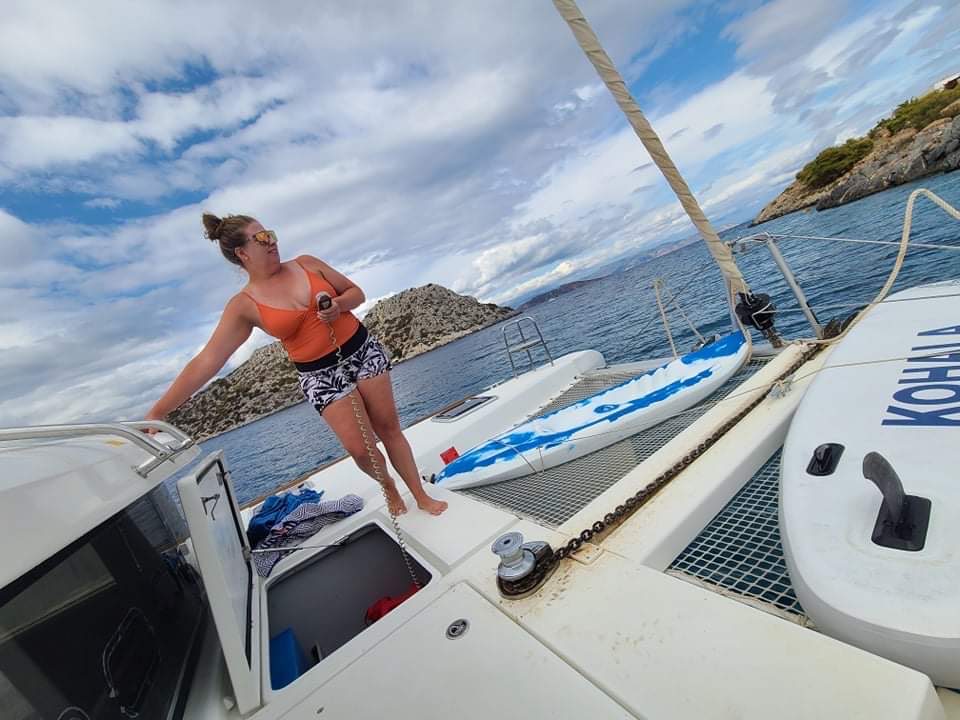
The short answer is…likely. Do you need to take sailing lessons before your trip? No. If your help is required with handling the anchor or helping with the ropes, the captain will assign work and teach you what to do.
What Else Will You Have to Pay For?
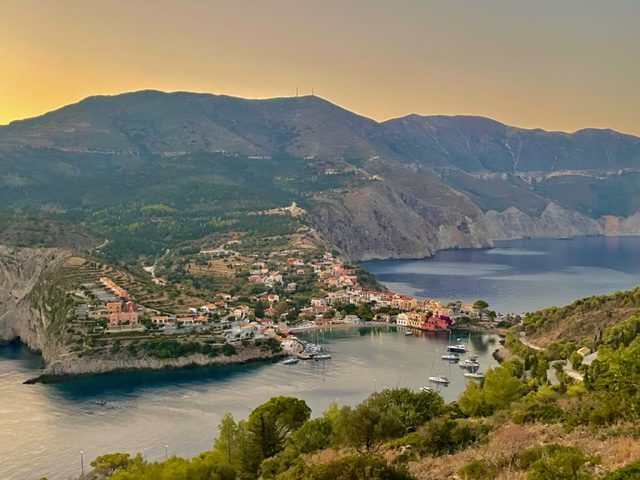
In addition to the boat rental cost, captain and cook fees and meals, you will also be expected to pay port fees, gas, and the crew’s tip. Port fees vary depending on where you stay each night. I would expect the port fees to range from 5 to 25 EUR in cash. At the end of the trip, the boat will be refilled with gas, and you are expected to pay that value. Of course, this amount will vary depending on your gas usage and the price of gas at the time. Just for your reference, on one trip we paid around 350 EUR, and the other we paid around 400 EUR.
The last fee you should expect to pay is the tip for the captain and cook. I did a lot of research trying to figure out what is appropriate for tipping. The best I could tell, it is recommended to tip 5-10% of the cost of the boat rental to each crew member. We followed this recommendation, but I have never been able to verify that this is appropriate.
Other Important Things to Know
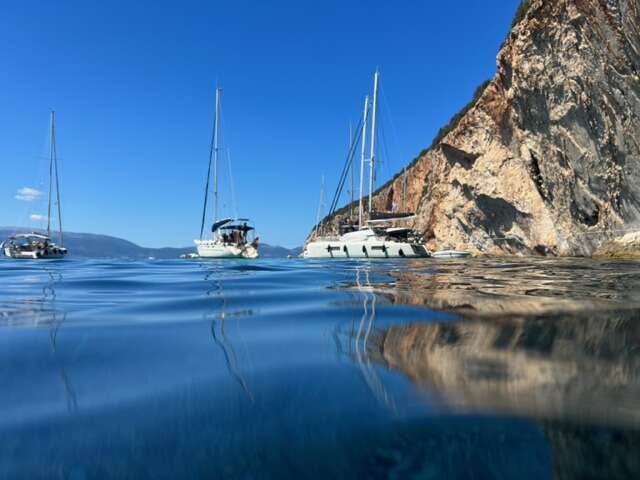
Be flexible! It is always a good idea to do your research and have a plan. But it is also important to be flexible with that plan. Weather can play a huge factor in what you can and cannot do.
Trust your captain! These captains are sailing the Greek islands day after day, and they know the best spots. Give them an idea of what you want to do and where you want to visit, and they will offer their advice. My advice is to trust their advice.
Love your natural hair! Sorry, but no hair dryers, straighteners, or curling irons should be used on the boats.
Only bio waste is allowed in the toilets. These means no toilet paper, wipes, or feminine products should be flushed down the toilets. The waste is dumped at sea, so these items would be damaging to the ocean’s ecosystem.
Groceries to Buy. When buying your groceries, do not forget things like spices, toilet paper, trash bags (large for the kitchen and small for the bathrooms), olive oil, dish soap, hand soap, and paper towels. We ended up bringing large trash bags, storage baggies, and spices from home. We did not think we would need to buy full containers of these items just for a week of sailing.
Avoid sea sickness! If you are prone to getting sea sick, make sure to bring sea sickness medication. If you get prescription medications, do not forget to schedule your doctor’s appointment ahead of time.
Buy Euros before arriving in Greece! Greece’s currency is Euros. You will need cash for port fees, the crews’ tips, and restaurants and shopping in some of the smaller ports. I recommend you buy Euros from your banking institution before you arrive. This is a much cheaper option than exchanging or getting money from an ATM once you arrive.
Things to Bring from Home
In addition to clothing, bathing suits, and your normal travel toiletries, there were several items we brought from home that we needed while sailing the Greek islands.
- Microfiber Beach Towel – These fold up to practically nothing, so packing them is not a big deal.
- Water Shoes – Greece’s shores are rocky and pebbly. Walking barefoot is very painful.
- Wine Tumbler – This was handy for making cocktails and keeping them cool. Ice is hard to come by!
- Sunscreen – Protect your skin from the harsh sun.
- Chapstick with Sunscreen – Do not forget to protect your lips!
- Inflatable Floats – These were so much fun to have while in the water, and they take up very little space in your luggage.
- Beach Bag – A beach bag was nice to have.
- Portable Charger – Not all the boats have a lot of plugs, so I kept a portable charger in my room to charge my phone at nights.
- Plug Adapter – You will need a plug adaptor.
- Portable Hair Straightener – If you are desperate for a hair straightener, you could bring this travel-size, cordless hair straightener.
- Playing Cards – Playing cards are great for low-key nights.
- Nerf Football – This was fun to play with in the water, and it was also a good way to meet new people.
You Are All Set!
Now you know everything that I know about sailing the Greek islands, so go ahead and book that boat! This trip will be one you will never forget, so do not hesitate to go! Greece is an amazing and beautiful country. And seeing it by catamaran is the best way!
You May Also Be Interested In
The Best 10-Day Greece Itinerary: Athens, Santorini, and Mykonos
How to Spend One Day in Athens, Greece
